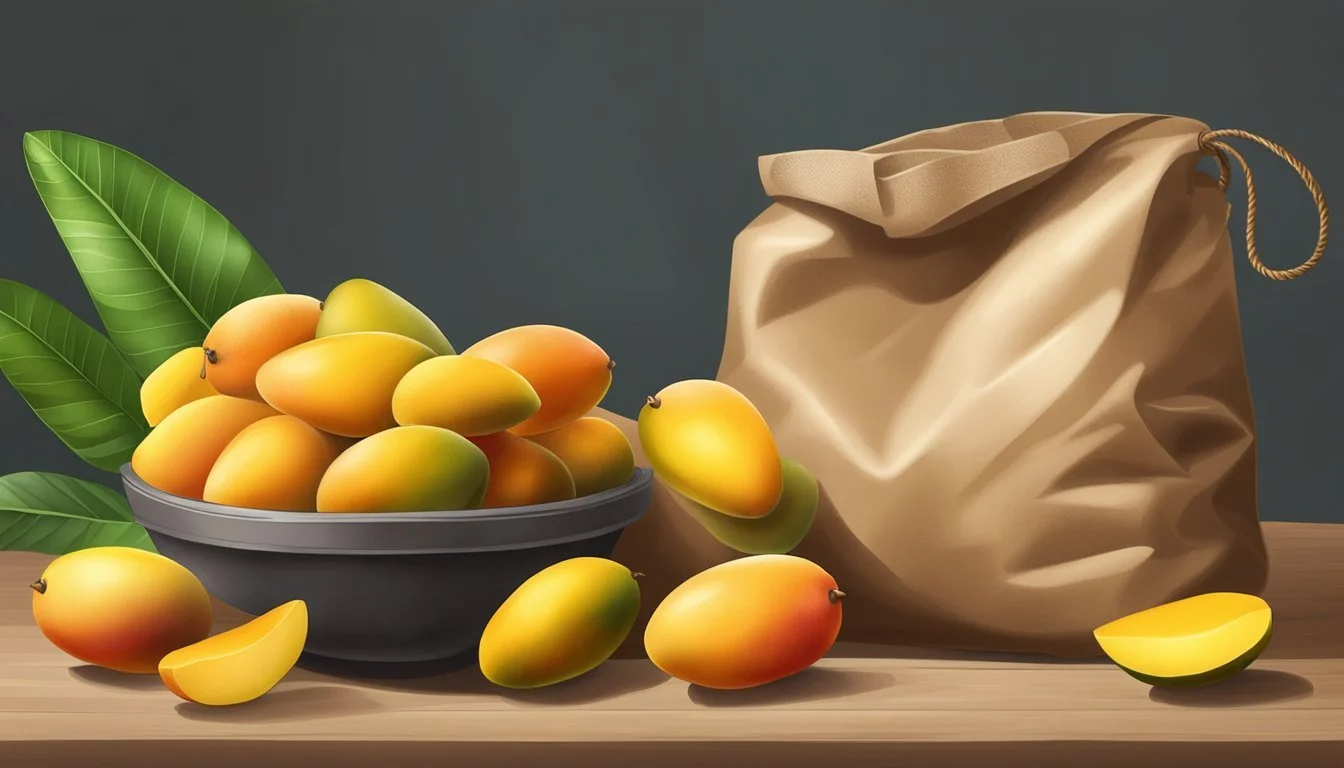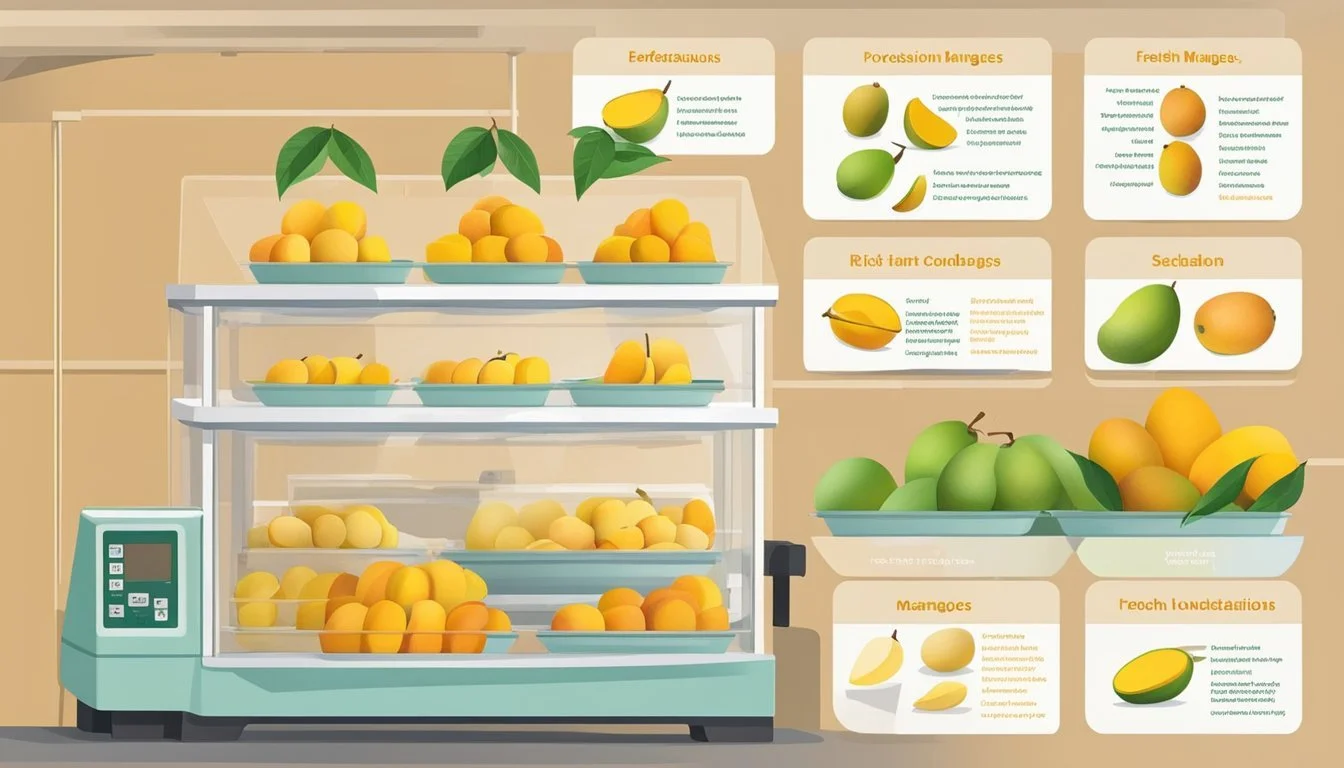Fresh vs Frozen Mango: Comparing Taste, Nutrition, and Convenience
Mangoes are a beloved tropical fruit enjoyed by many, but the choice between fresh and frozen varieties can leave consumers puzzled. Both options offer unique benefits and potential drawbacks, making the decision less straightforward than it may seem.
Frozen mangoes often retain more nutrients than their fresh counterparts due to being harvested at peak ripeness and quickly frozen, preserving their nutritional value. Fresh mangoes, while delicious, may lose some nutrients during transport and storage. However, the taste and texture of fresh mangoes are unparalleled, offering a juicy, aromatic experience that frozen fruits can't quite match.
Convenience plays a significant role in the fresh vs. frozen mango debate. Frozen mangoes are pre-cut, readily available year-round, and have a longer shelf life. Fresh mangoes require proper selection, ripening, and preparation, but offer the satisfaction of enjoying a whole fruit in its natural state. The choice ultimately depends on individual preferences, intended use, and practicality.
Nutritional Profile of Mangoes
Mangoes are nutrient-dense fruits packed with essential vitamins, minerals, and beneficial compounds. They offer a range of health-promoting elements while being relatively low in calories.
Vitamins and Minerals Content
Mangoes are an excellent source of vitamin C, providing over 60% of the daily recommended intake per cup. This vitamin supports immune function and collagen production. Mangoes also contain significant amounts of vitamin A, crucial for eye health and immune function.
The fruit offers a good dose of vitamin K, important for blood clotting and bone health. Mangoes provide essential minerals like potassium, which aids in heart function and blood pressure regulation. They also contain copper, necessary for red blood cell formation and iron absorption.
Folate, a B-vitamin vital for cell growth and DNA synthesis, is present in mangoes. The fruit also supplies magnesium, supporting muscle and nerve function.
Fiber, Antioxidants, and Other Nutrients
Mangoes are rich in dietary fiber, with about 3 grams per cup. This fiber aids digestion, promotes feelings of fullness, and helps maintain healthy blood sugar levels.
The fruit boasts a variety of antioxidants, including beta-carotene, zeaxanthin, and quercetin. These compounds help protect cells from oxidative stress and may reduce the risk of chronic diseases.
Mangoes contain enzymes like amylases, which can assist in breaking down carbohydrates. The fruit also provides small amounts of protein and healthy fats, contributing to its overall nutritional value.
One cup of mango contains approximately:
Calories: 99
Carbohydrates: 25g
Fiber: 3g
Protein: 1.4g
Fat: 0.6g
Preparation and Consumption Methods
Fresh and frozen mangoes offer versatile options for culinary creativity. These tropical fruits can be incorporated into a wide range of dishes, from refreshing snacks to decadent desserts.
Fresh Mango Uses
Fresh mangoes shine in raw applications. Slice them for a quick snack or dice them for fruit salads. Add cubes to breakfast bowls or oatmeal for a burst of flavor. Blend fresh mango into smoothies for a creamy texture and natural sweetness. Chop it finely for salsas or chutneys to accompany savory dishes.
For desserts, layer fresh mango slices in parfaits or trifles. Use it as a topping for yogurt or ice cream. Incorporate diced mango into baked goods like muffins or quick breads for added moisture and tropical flair.
Frozen Mango Applications
Frozen mango chunks are perfect for smoothies, creating an instantly chilled and thick consistency. They can be blended directly from frozen, no thawing required. Use them in homemade ice cream or sorbet recipes for a fruity twist.
Thawed frozen mango works well in baked goods like cobblers or pies. It can also be pureed for use in sauces or dressings. Add frozen mango to overnight oats for a cool, refreshing breakfast. For a simple dessert, partially thaw the chunks and enjoy them as a sweet, icy treat.
Health Benefits of Mango
Mangoes offer numerous health benefits due to their rich nutrient profile. They contain essential vitamins, minerals, and antioxidants that support various bodily functions.
Digestive Health and Dietary Fiber
Mangoes are an excellent source of dietary fiber, promoting digestive health. One cup of chopped mango provides 2.6 grams of fiber, aiding in regular bowel movements and preventing constipation.
The fiber in mangoes also acts as a prebiotic, feeding beneficial gut bacteria. This supports overall digestive system function and may improve nutrient absorption.
Mangoes contain enzymes that help break down proteins, further enhancing digestion. These enzymes can be particularly helpful for individuals with digestive issues.
Immune System and Vitamins
Mangoes are packed with immune-boosting nutrients, especially vitamin C. A single cup of mango provides 67% of the daily recommended intake of vitamin C.
Vitamin C supports the production and function of white blood cells, crucial for fighting infections. It also acts as a powerful antioxidant, protecting cells from damage caused by free radicals.
Mangoes contain beta-carotene, which the body converts to vitamin A. This nutrient is essential for maintaining healthy mucous membranes, a key part of the immune system's first line of defense.
Heart Health and Potassium
The potassium content in mangoes contributes to heart health by helping regulate blood pressure. Adequate potassium intake is associated with a reduced risk of stroke and heart disease.
Mangoes contain polyphenols, including mangiferin, which have been shown to have cardioprotective properties. These compounds may help lower cholesterol levels and reduce inflammation in blood vessels.
The fiber in mangoes also plays a role in heart health by helping to lower LDL (bad) cholesterol levels. This can contribute to a reduced risk of cardiovascular disease.
Comparing Fresh and Frozen Mango
Fresh and frozen mangoes offer unique qualities in taste, texture, nutrition, and convenience. Each form has distinct advantages depending on individual needs and preferences.
Taste and Texture Differences
Fresh mangoes provide a vibrant, juicy experience with complex flavors that develop as the fruit ripens. Their texture ranges from firm to soft, depending on ripeness.
Frozen mangoes offer consistent sweetness and a slightly altered texture due to the freezing process. They maintain much of their original flavor profile, often picked at peak ripeness before freezing.
Some consumers find frozen mangoes sweeter and more flavorful than imported fresh mangoes, which may be picked unripe for shipping.
Nutrition and Health Impact
Both fresh and frozen mangoes are nutrient-dense fruits rich in vitamins A and C, fiber, and antioxidants. Freezing preserves most nutrients effectively.
Fresh mangoes may have a slight edge in vitamin C content, as some loss can occur during freezing and thawing.
Frozen mangoes retain their nutritional value for longer periods, making them a reliable source of nutrients year-round.
Key Health Benefits:
Lower blood pressure
Reduced risk of heart disease and stroke
Improved digestion due to fiber content
Convenience and Use Cases
Fresh mangoes require careful selection, ripening, and timely consumption within 1-2 weeks to avoid spoilage.
Frozen mangoes offer significant convenience advantages:
Pre-cleaned and pre-chopped
Longer shelf life (up to 2 years frozen)
Easy portioning
Fresh mangoes are ideal for:
Immediate snacking
Recipes requiring specific texture
Frozen mangoes excel in:
Smoothies
Baking
Off-season availability
Frozen mango allows for spontaneous use without concern for ripeness or spoilage, making it a practical choice for busy households.
Practical Considerations
The choice between fresh and frozen mangoes involves several key factors that impact storage, selection, and cost. Understanding these practical aspects can help make informed decisions when purchasing and using mangoes.
Shelf Life and Storage Tips
Fresh mangoes typically last 1-2 weeks before spoiling. Ripe mangoes should be stored in the refrigerator to extend their shelf life. Unripe mangoes can be left at room temperature to ripen naturally. To speed up ripening, place mangoes in a paper bag with an apple or banana.
Frozen mangoes can last up to two years when stored properly in the freezer. They should be kept at a constant temperature of 0°F (-18°C) or below. Once thawed, frozen mangoes should be used within 24-48 hours and should not be refrozen.
For both fresh and frozen mangoes, proper storage is crucial to maintain quality and prevent spoilage. Always check for signs of mold or off-odors before consuming.
Selecting Quality Mangoes
When choosing fresh mangoes, look for fruits with smooth, unblemished skin. Ripe mangoes yield slightly to gentle pressure and often have a sweet aroma near the stem end. Avoid mangoes with dark spots or excessive softness, as these may indicate overripeness or bruising.
For frozen mangoes, check the packaging for ice crystals or signs of freezer burn. High-quality frozen mangoes should be individually quick frozen (IQF) to prevent clumping and maintain texture.
Color is not always an indicator of ripeness, as different mango varieties have unique hues when ripe. Familiarize yourself with common mango varieties to better judge ripeness.
Cost-Efficiency and Budgeting
Fresh mangoes can be more expensive, especially when out of season or in regions where they're not locally grown. Prices fluctuate based on availability and seasonality. Buying in bulk when prices are low can be cost-effective, but consider storage limitations and potential waste.
Frozen mangoes often provide better value for money, especially in off-seasons. They're pre-cut and ready to use, saving time and reducing waste. Bulk purchases of frozen mangoes can offer significant savings.
Consider the intended use when deciding between fresh and frozen. Fresh mangoes are ideal for eating out of hand or in dishes where texture is crucial. Frozen mangoes work well in smoothies, baked goods, and cooked applications.
Culinary Applications
Mangoes offer versatility in both fresh and frozen forms, enhancing a wide array of dishes with their tropical sweetness and vibrant color. From refreshing beverages to savory main courses, this fruit adapts well to various cooking methods and flavor profiles.
Innovative Mango Recipes
Fresh mangoes shine in grilled applications, caramelizing beautifully on the grill for a smoky-sweet treat. Grilled mango slices pair wonderfully with grilled meats or can be enjoyed on their own as a healthy dessert. For a cool treat, blend frozen mango chunks into a creamy sorbet or add them to smoothies for instant thickness and tropical flavor.
Mango cobbler offers a delightful twist on traditional fruit desserts. The natural sweetness of ripe mangoes reduces the need for added sugar, making it a healthier option for those with a sweet tooth.
Mango as an Ingredient in Diverse Dishes
Frozen mango cubes work exceptionally well in breakfast dishes. Stir them into oatmeal for a burst of flavor and nutrition, or layer them with yogurt and granola for a quick parfait. The convenience of pre-cut frozen mango makes these preparations effortless.
In savory applications, diced fresh mango adds a surprising element to salsas and chutneys, complementing grilled fish or chicken. Puréed mango can be incorporated into marinades, lending sweetness and acidity to meats.
Mango skin, often discarded, can be candied for a unique garnish or blended into smoothies for added fiber and nutrients.
Risks and Considerations
While mangoes offer numerous health benefits, there are some potential risks and considerations to keep in mind. These include impacts on blood sugar levels and possible allergic reactions in some individuals.
Impact on Blood Sugar and Diabetes
Mangoes contain natural sugars that can affect blood glucose levels. A single cup of mango provides about 25 grams of carbohydrates, which may cause blood sugar spikes in some people.
Diabetics should monitor their mango intake carefully. The glycemic index of mango is moderate, ranging from 51 to 60, depending on ripeness. Riper mangoes tend to have a higher glycemic index.
Pairing mango with protein or healthy fats can help slow sugar absorption. Frozen mango may have a slightly lower glycemic impact due to the cooling process.
Potential Allergies and Sensitivities
Some individuals may experience allergic reactions to mangoes. The fruit contains urushiol, the same compound found in poison ivy and poison oak.
Symptoms of mango allergy can include:
Skin rash or hives
Itching or swelling of the mouth and throat
Difficulty breathing
Those with latex allergies may also be sensitive to mangoes due to cross-reactivity. This is known as latex-fruit syndrome.
Frozen mangoes may reduce the risk of allergic reactions for some people, as the freezing process can alter certain proteins. However, those with severe allergies should avoid mangoes entirely.
Environmental and Ethical Implications
Mango production has significant environmental and ethical impacts to consider. The choice between fresh and frozen mangoes involves complex sustainability tradeoffs.
Sustainable Farming Practices
Many mango farms employ monoculture techniques, which can harm biodiversity. Large-scale operations often use nitrogen fertilizers that may pollute groundwater. Some growers are transitioning to more sustainable methods.
Organic mango farming reduces pesticide use and promotes soil health. Integrated pest management helps control insects naturally. Drip irrigation conserves water in drier regions where mangoes thrive.
Fairtrade certification ensures ethical labor practices and fair wages for workers. This addresses historical issues of exploitation in some mango-producing countries.
Local vs. Imported Produce
Transportation is a key factor in mango's environmental footprint. Imported fresh mangoes have higher emissions due to air freight. Frozen mango chunks use energy for processing and cold storage but can be shipped more efficiently.
Local mangoes reduce food miles but may require energy-intensive greenhouses in cooler climates. Seasonal availability limits year-round local options in many areas.
India, the world's largest mango producer, grows hundreds of varieties. Importing provides access to diverse types but impacts sustainability. Supporting local mango cultivation preserves regional biodiversity and traditional farming knowledge.
Comparative Analysis with Other Fruits
Mangoes offer unique nutritional benefits and culinary versatility compared to other fruits. Fresh and frozen mangoes provide distinct advantages in different contexts.
Nutritional Differences: Mango vs. Other Fruits
Mangoes excel in vitamin C content, surpassing apples and rivaling citrus fruits. A 100g serving of mango provides about 60% of the daily recommended vitamin C intake. Mangoes also contain more vitamin A than apples, blueberries, and strawberries.
Compared to berries, mangoes have a higher sugar content but fewer antioxidants. Blueberries and strawberries outperform mangoes in terms of antioxidant capacity.
Mangoes offer a good source of dietary fiber, similar to apples. However, they fall short of the fiber content found in raspberries or blackberries.
Frozen mangoes retain most of their nutritional value, often surpassing fresh-stored fruits in vitamin retention. This preservation of nutrients makes frozen mangoes a viable alternative to fresh options.
Usage in Diets and Meal Planning
Mangoes versatility extends to various dietary applications. They serve as excellent additions to smoothies, either fresh or frozen. Frozen mango chunks blend easily, creating a creamy texture without added ice.
In fruit salads, fresh mangoes provide vibrant flavor and appealing texture. Frozen mangoes work well in baked goods, maintaining shape and flavor during cooking.
For snacking, dried mango offers convenience but contains concentrated sugars. Fresh mango slices make a hydrating, low-calorie snack option.
Mangoes complement savory dishes too. Their sweet-tart profile pairs well with grilled meats or adds depth to salsas and chutneys.
In meal prep, frozen mangoes offer year-round availability and reduce food waste. They eliminate the need for ripening and peeling, saving time in busy kitchens.





